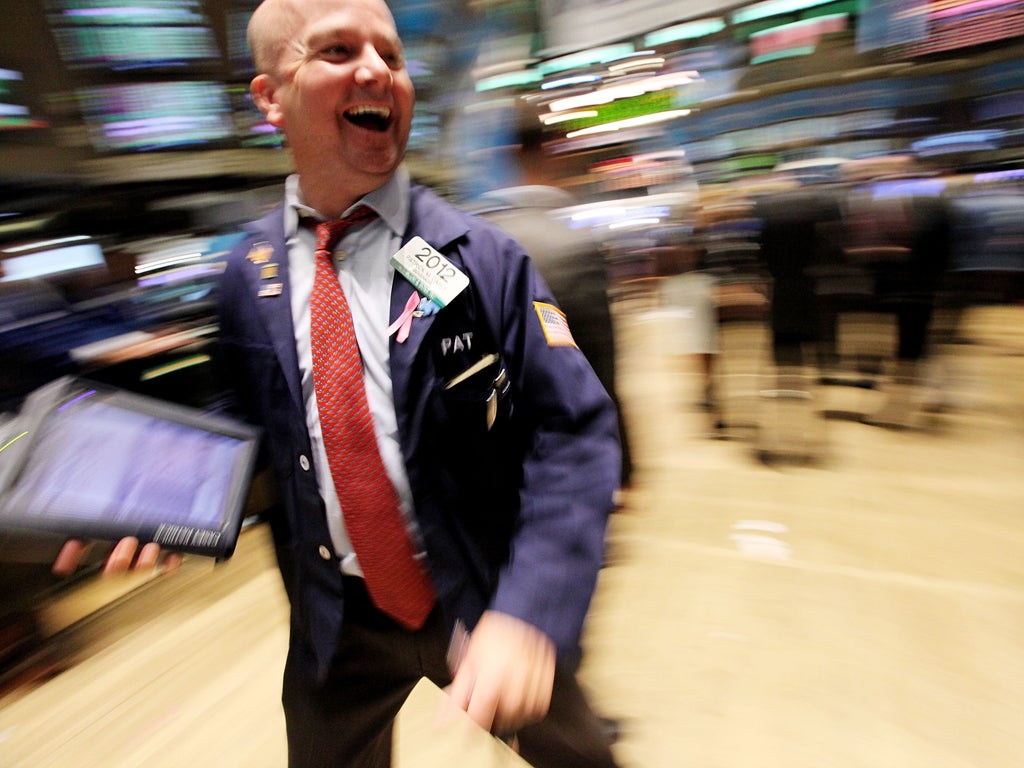If you believe investors, we’re on the mend
These price movements represent the considered opinion of thousands of professionals


Financial markets, whose power often exceeds that of national governments, have started to feel cheerful.
This week, share prices have either reached all-time highs (US and Germany) or their best levels since 2008. This is a remarkable phenomenon for we have scarcely said goodbye to austerity. Indeed, in the UK the Chancellor of the Exchequer remains committed to rigorous policies.
Yet if you look at the world through the eyes of international investors or money-market dealers, you will have been struck by a multiplicity of encouraging signs. Anything that suggests that interest rates are going to remain very low is good news. Thus, on Monday, the head of the European Central Bank, Mario Draghi, reiterated the bank’s readiness to trim rates again if needed, following a cut last week. Then, immediately following these comforting words, in came the Reserve Bank of Australia to announce a cut in interest rates to a record low.
This is important because a return to normal levels would be hard to handle. Imagine the effect in the United Kingdom when mortgage rates begin to rise – whenever that is. Many families will find the pressure on their finances almost intolerable. The considerable pain that savers have suffered would be transferred to borrowers. This could cut off any economic recovery.
Meanwhile, although the prolonged period of low interest rates has not provided the tonic for business activity that was expected, it does have an insidious effect in the financial markets themselves, engendering a hunt for income. At the moment, one would be fortunate to earn more than a half per cent per annum on short-term deposits. So ordinary savers have become more attracted to stock-market investment while professional investors have been prepared to embrace riskier opportunities than they would have done even a few weeks ago.
An example of this was the second item of good news that the financial markets relished. This was Portugal’s first successful sale of 10-year bonds to international buyers since 2011. Indeed, the Portuguese Government could have sold more than three times the amount it was seeking to raise. The coupon on these bonds was a very nice 5.65 per cent.
This in turn serves to strengthen the notion that the eurozone crisis is over for the time being. Take even the case of Greece. This week, the International Monetary Fund reported that Greece’s progress in balancing its books had been “exceptional by any international comparison”. Greece had also significantly reduced its competitiveness gap by making far-reaching labour market reforms. Admittedly, tax evasion remains rife, but still the praise of the IMF is unusual and welcome. At the same time, Italy has brought its long political crisis to an end with the appointment of a new prime minister.
Of course, to get a bull market going requires more than low interest rates – which would normally signal recession – and the waning of the eurozone crisis. But fortunately there is more. The banks are starting to get their houses in order. RBS, for instance, has returned to profit for the first time in 18 months. This result was followed this week by a confident report from HSBC. First quarter profits almost doubled thanks to lower bad debt charges. And the chief executive, Stuart Gulliver, said that as an industry “we are probably moving into calmer waters”.
More important still, the German and the American economies are at last beginning to speed up. Two days ago, German factory orders were shown to be rising whereas economists had expected a fall. New orders received by German manufacturers increased by a seasonally adjusted 2.2 per cent in March, the same as the previous month. Then yesterday it was announced that German industrial production had unexpectedly risen. It increased 1.2 per cent from February, when it gained 0.6 per cent. “German industry has entered the current quarter with a lot of momentum,” said Heinrich Bayer, an economist at Deutsche Postbank AG in Bonn.
When economic news surprises “on the upside” – as the German examples show – it is always encouraging. The same pattern has been present in the US recently. US consumer spending has come in higher, whereas economists had expected no change. Job creation is also exceeding expectations. Payrolls expanded by 165,000 jobs last month and the unemployment rate declined to a four-year low of 7.5 per cent. This helped to push the Dow Jones index above 15,000 – an all-time high – on Tuesday.
I leave to the last the best performing stock market of all, Tokyo, which has risen by 50 per cent in the past six months. The new Japanese Prime Minister promised to do “whatever it takes” to get the economy going. This comprises a policy of big spending and aggressive central bank easing. It is still a work in progress, the success of which, it must be emphasised, is not guaranteed. Nonetheless, I confess I pay quite a lot of attention to stock-market turning points of the kind we may have seen this week. For these share-price movements represent the considered opinions of thousands of investment professionals around the world. They are far from infallible, but that they are more optimistic now than they have been for some years should be a source of comfort.
a.whittamsmith@independent.co.uk
Join our commenting forum
Join thought-provoking conversations, follow other Independent readers and see their replies
Comments
Bookmark popover
Removed from bookmarks